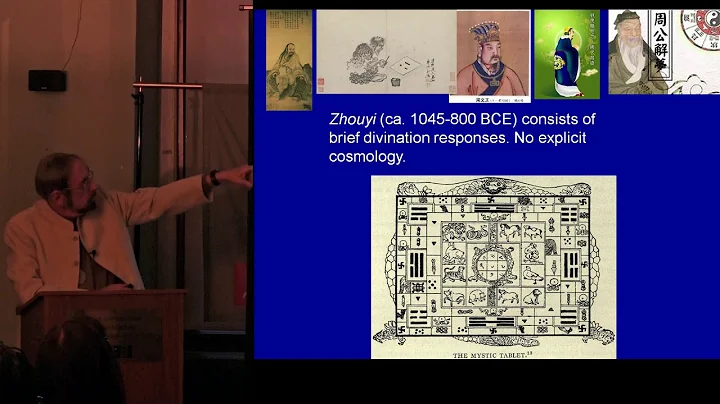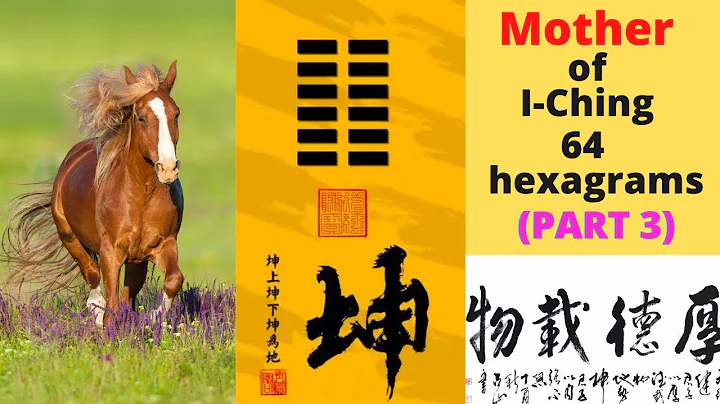
In the previous article, we analyzed hexagrams 51 to 60 of " The Book of Changes". Confucius said that "you will know your destiny at fifty." After half a life, we already know what our responsibilities and missions are in this life. As for Whether it can be completed or not is not something we can control, so it is called " do your best and listen to destiny ".
Knowing destiny does not mean resigning oneself to destiny, but an open-minded state of mind that can see things and let go.
If hexagrams 51 to 60 are a process of spiritual purification and transformation after we experience the world, then after hexagram 60, when life reaches the final stage, will there be new changes and developments?
Today we will analyze the last four hexagrams of the "Book of Changes", that is, from hexagrams 61 to 64.
The sixty-first hexagram: Zhongfu hexagram

"Believe it in moderation, so accept it with Zhongfu. Zhongfu means trust."
The previous hexagram " Jie hexagram " We understand that reasonable moderation is to do Don't overdo anything. Only when we are moderate can we win the trust of others. Therefore, after the Jie hexagram is the "Zhongfu hexagram".

Zhongfu hexagram specifically analyzes the hexagram about "integrity". "Zhong" means reasonable and "Fu" means integrity. Zhongfu means that whether we are in life or in life, we must be honest and reasonable. of integrity.
What is reasonable integrity?
Zhongfu Gua reminds us that although integrity is the foundation of human conduct, it has a prerequisite for distinguishing right from wrong. It does not mean that being sincere and honest and being trustworthy to others means integrity. This is a misunderstanding of integrity.
Judging from the hexagrams of the Zhongfu hexagram, the two central lines of the six hexagrams are both yin lines, but the four outer hexagrams are all yang lines. This shows that true integrity requires softness on the inside and hardness on the outside, that is, we must be humble and soft on the inside. , but we have to be tougher on the outside, and we can’t let others see you wavering.
Therefore, reasonable integrity is a combination of hardness on the outside and softness on the inside, rather than being a good old man who is soft both inside and outside. He listens to everything he says and believes everything he does. This is the foolish "sincerity" and "trust" .
True integrity is to stick to the right path in the heart, and it is a kind of positive energy that can influence other people. When others are infected by the power of your integrity, they will be able to trust you and obey you, instead of just thinking that you are honest and trustworthy.
The sixty-second hexagram: Xiaoguo hexagram

"Those who believe in it must do it, so they will accept it as minor faults."
The previous hexagram "Zhongfu Hexagram" we understand true integrity, a person who sticks to integrity. , stick to the right path internally and be firm and decisive externally. Once we implement integrity decisively, we may do things a little too much. Therefore, the Zhongfu hexagram is followed by the "Xiaoguo hexagram".

Minor faults, just a little bit of minor faults. Of course we don't like mistakes, but "no one can make mistakes without being a sage." It is inevitable that there will be some small mistakes in life. If we are afraid of making mistakes and hold back, then life will lose its meaning.
If a person is not allowed to make even a small mistake, then this person will become too cautious, which means going too far is not enough. Xiao Guo Gua tells us that life is about gaining valuable experience through constant trial and error. In this process, we must grasp the right balance, avoid making big mistakes, and leave room for small mistakes.
To judge whether a fault is major or minor, we must look at the intensity of the damage it brings. If the damage is very small and within our tolerance, then it is a minor fault; if the damage is very large and within our tolerance, it is a minor fault. Otherwise, it is a big mistake.
Therefore, the Xiao Guo Gua talks about the impartial and righteous way. It reminds us that within a reasonable range, some small mistakes can be allowed and do not overcorrect.
So how should we grasp the golden mean between "exceeding" and "less than"? When a mistake occurs, what reasonable adjustments should be made?
This is the wisdom contained in the "Xiao Guo Gua".
The sixty-third hexagram: Jiji hexagram

"Those who have had faults must be helped, so they should be given Jiji."
The previous hexagram "Xiaoguo hexagram" has mastered the golden mean. When mistakes occur, we should correct them in time. By making corrections, we can push things to success. Therefore, after the Xiaoguo hexagram is the " Jiji hexagram".

Ji means crossing the river, and Jiji means crossing and completing. Jiji hexagram symbolizes the success of things.
The Jiji hexagram is the only hexagram among the 64 hexagrams in which all six lines are in place. Therefore, it symbolizes perfection and success.. However, although this hexagram is a complete success, there are also crises and dangers hidden in it. .
Because things must be reversed to the extreme, and they must be stripped to the extreme, this is the natural law of the universe.
The moment of success is already in the past, and the next moment, perfect things will appear incomplete again.
Therefore, Ji Ji Gua reminds us that when we are successful, we must not indulge in victory or get carried away with ourselves , but we must know how to stick to the right path and guard against arrogance and impetuosity. Otherwise, Ji Ji will end up dead in the end and all talents will be exhausted, and the direction of career and life will be landslide.
The sixty-fourth hexagram: Weiji hexagram

"Things are inexhaustible, so the end of receiving them will be without relief."
The previous hexagram "Jiji hexagram" symbolizes success and perfection, but this is not the end of life. Because if you stay in Jiji, there will be no new changes and developments in life, so after Jiji, there will be "not Ji".

" Weiji hexagram " is the last hexagram among the 64 hexagrams in the "Book of Changes", and it is also the only hexagram in which all six lines are not in place. The previous hexagram "Jiji hexagram" symbolizes success, but "Weiji hexagram" means failure, but this does not mean that success will be followed by failure.
"The Book of Changes" tells us that the occurrence and development of anything are cyclical, just as prosperity will inevitably decline, and failure will be prosperous. Success will be followed by failure, and failure will be followed by success.
However, the reason why "Weiji" is placed as the last hexagram is because it means unfinished, which means that the endless development of everything in the universe is always unfinished, and in "Weiji" Within it, there is always potential for unlimited development.
When we are in "Jiji", don't be arrogant and careless. When we are in "Weiji", don't be discouraged.. The Weiji hexagram enlightens us to always have hope and keep working hard.
Summary:

All 64 hexagrams in "The Book of Changes" have been introduced so far. Although we have only analyzed the most basic meaning of each hexagram in "The Book of Changes", we have passed the logical order given by " Preface Hexagrams ", from From hexagram 1 to hexagram 64, an overall review has been completed that is as easy to understand and concise as possible.
There are a thousand Hamlets in the eyes of a thousand readers, and there are a thousand "Book of Changes" in the eyes of a thousand readers, because language is limited, but wisdom is infinite. Everyone has their own unique perspective, and their interpretation of classics also varies with each person's experience and cultivation.
is here to introduce some ideas, hoping to arouse everyone's interest in the "Book of Changes" and allow us to pick up and apply the classic wisdom of our ancestors. When we can find a way to get started and have an overall impression, we can go in and slowly go deeper. Next, follow the relationship between ourselves and the "Book of Changes" and find our own "pilgrimage" path.



![The Ancient Secret Of The Flower Of Life - Audiobook [With PICTURES From The Book] - Chapters 1-4 - DayDayNews](https://i.ytimg.com/vi/e2xELGkHuJg/hqdefault.jpg?sqp=-oaymwEcCOADEI4CSFXyq4qpAw4IARUAAIhCGAFwAcABBg==&rs=AOn4CLDQU8kkpfTIONKreJKI92knHiZHcQ)

















